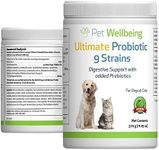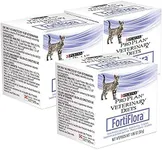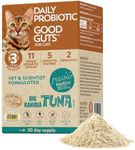Buying Guide for the Best Probiotic For Cats
Choosing the right probiotic for your cat can make a big difference in their digestive health, immune system, and overall well-being. Probiotics are beneficial bacteria that help maintain a healthy balance in your cat’s gut. When shopping for a probiotic, it’s important to understand what makes one product different from another and how to match those differences to your cat’s specific needs. By focusing on a few key specifications, you can make a more informed decision and select a probiotic that will best support your cat’s health.Strain DiversityStrain diversity refers to the number and types of beneficial bacteria included in the probiotic. This is important because different strains can have different effects on your cat’s digestive system and immune health. Some products contain just one or two strains, while others may have a blend of several. If your cat has a specific issue, like diarrhea or a sensitive stomach, a targeted strain might be best. For general health and prevention, a product with multiple strains can offer broader support. Consider your cat’s health needs and look for a probiotic with strains that address those concerns.
CFU Count (Colony Forming Units)CFU count measures the number of live, active bacteria in each serving of the probiotic. This is important because a higher CFU count generally means more beneficial bacteria are delivered to your cat’s gut. Probiotics for cats typically range from a few million to several billion CFUs per dose. For everyday maintenance, a lower CFU count may be sufficient, but if your cat is recovering from illness or antibiotics, a higher CFU count might be more effective. Match the CFU count to your cat’s current health situation and needs.
Formulation (Powder, Capsule, Chew, Liquid)Probiotics for cats come in different forms, such as powders, capsules, chews, or liquids. This matters because some cats are picky eaters or may have trouble swallowing pills. Powders and liquids can be mixed into food, making them easier for most cats to take. Chews can be a good option if your cat likes treats. Consider your cat’s preferences and what will be easiest for you to give consistently.
Added IngredientsSome probiotics include extra ingredients like prebiotics, vitamins, or flavorings. Prebiotics help feed the good bacteria, making the probiotic more effective, while vitamins can provide additional health benefits. However, some added ingredients, like artificial flavors or fillers, may not be suitable for cats with allergies or sensitivities. Check the ingredient list and choose a product that matches your cat’s dietary needs and sensitivities.
Storage and Shelf StabilityProbiotics can be sensitive to heat, moisture, and light, which can affect their potency. Some products need to be refrigerated, while others are shelf-stable and can be stored at room temperature. Shelf-stable options are more convenient if you travel or want to keep the product handy, but always check the expiration date and storage instructions. Choose a probiotic that fits your lifestyle and ensures the bacteria remain effective until the end of the product’s use.












